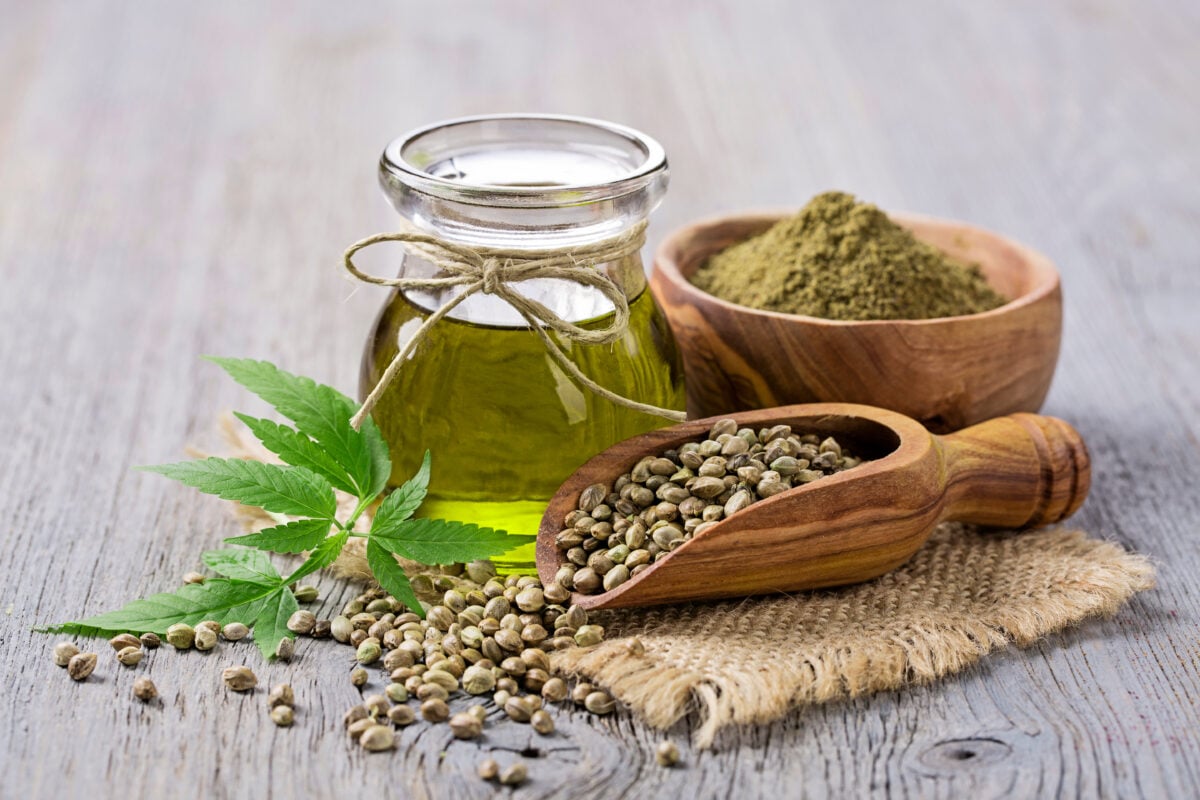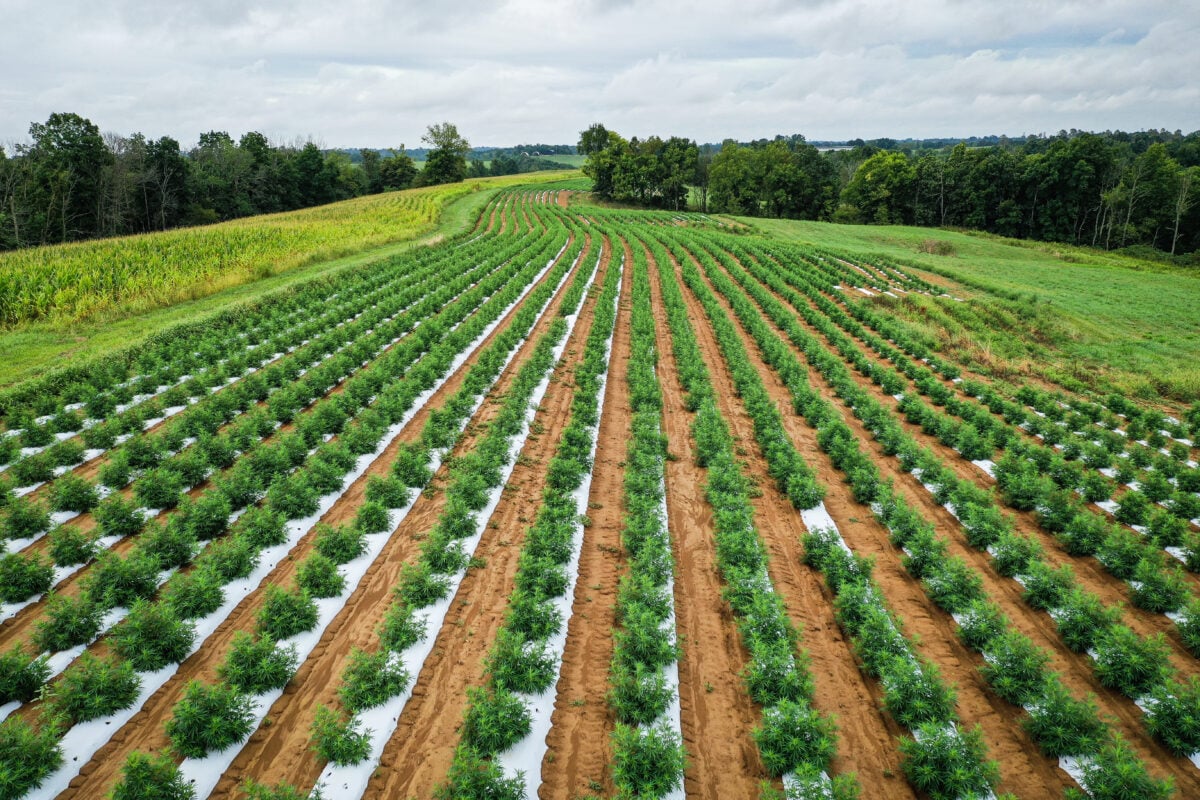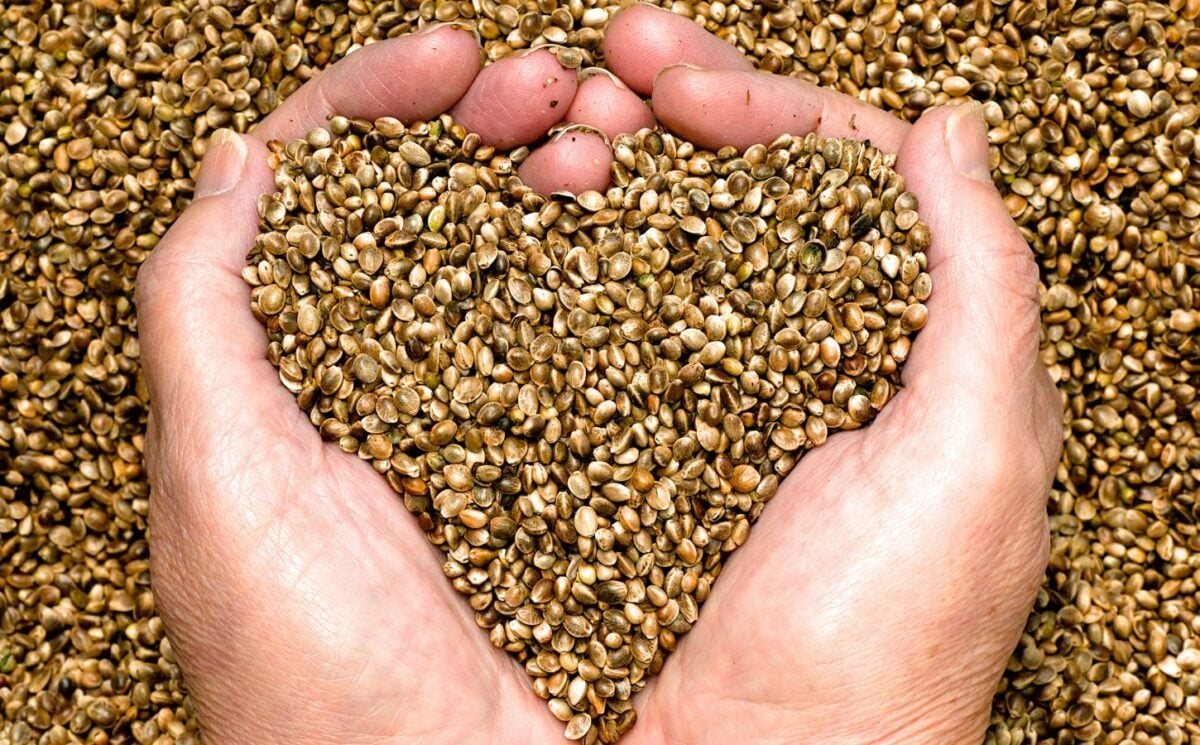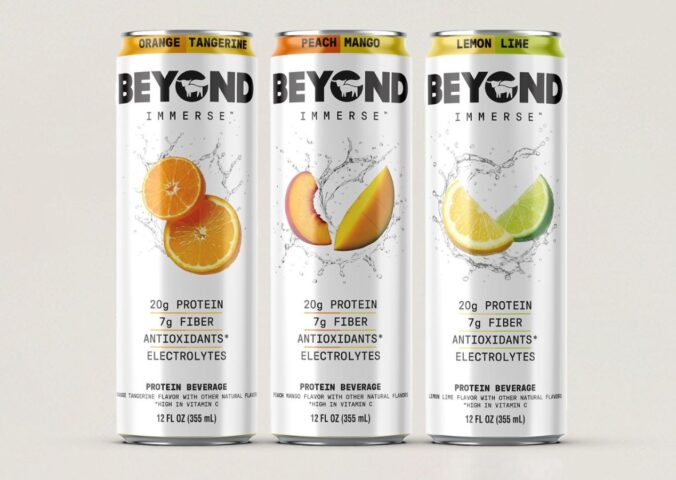Hemp is a type of plant grown for consumable and industrial use with an enormous variety of applications. It can be used in anything from food (as a recipe ingredient, in supplements, and as a distinctive, nutty cooking oil) to the production of cosmetics (in lotions, skincare, and shampoos), as well as in the automobile, railway, and aviation industries.
Hemp has been hailed as a sustainable, economical, and uniquely useful alternative to many of the high-impact and problematic materials modern society has become dependent on – fossil fuels, plastic, textiles, and concrete, to name just a few.
According to the European Commission, “hemp production offers broad opportunities for farmers, industrial sectors, and consumers in the European Union,” and the land dedicated to cultivation rose by a significant 60 percent between 2015 and 2022. During this same period, overall production of hemp rose by 84.3 percent to reach nearly 180,000 tons.
Contrary to popular belief, it’s worth noting that hemp and marijuana are not the same plant. Instead, they are merely the same species – cannabis sativa. High-THC cannabis is classed as marijuana, while non-psychoactive varieties are classed as hemp, the all-purpose plant we’re focusing on here. (In the UK, however, legislation does not differentiate between the two effectively, negatively impacting the degree to which the crop can be farmed.)
While industrial hemp definitely can’t alter your consciousness, its seeds do have several notable nutritional benefits, and some studies indicate that they might support measurable health improvements, as summarized by Medical News Today here and Healthline here.
4 nutritional benefits of hemp

Hemp seeds can be eaten in countless ways, such as creamy, nutritious, plant-based milk, and in this luxurious carrot cake recipe. They can be sprinkled on salads, mixed into smoothies, and even used as a gluten-free substitute for breadcrumbs. They taste nutty, a little bit like sunflower seeds, and are packed with nutrients. Here is a quick rundown.
High in protein
Protein is an important part of any healthy diet. It provides the body with energy and helps to repair tissue after exercise or injury. Hemp seeds contain almost as much protein as beef or lamb, with two to three tablespoons providing approximately 11g.
They are also considered a complete protein source – which means that they contain all of the essential amino acids – and over 25 percent of their total calories are made up of protein, a much higher percentage than chia, flax, and other similar seeds.
Full of vitamins and minerals
In addition to protein, hemp seeds are rich in a wide variety of vitamins and minerals, including calcium, sulfur, potassium, magnesium, phosphorus, niacin, folate, thiamine, riboflavin, vitamin B6, and vitamin E.
Rich in fiber
While the majority of hemp seeds’ fiber content can be found in its outer husk, even shelled varieties contain a significant amount at approximately 1.2g per three tablespoons. Whole hemp seeds contain around 20 percent soluble and 80 percent insoluble fiber, with the former helping us feel fuller for longer and the latter supporting good colon health.
Good source of omega-3
Hemp seeds are an excellent source of unsaturated fats, including essential omega-3 fatty acids such as alpha-linolenic acid and omega-6 linoleic acid, which the human body cannot produce and therefore must be absorbed via food and drink. Hemp seeds are over 30 percent fat, yet contain minimal saturated fats and zero trans fats.
6 health benefits of hemp
The concept of “superfoods” is often regarded as a marketing myth, and no single ingredient or type of food can replace a well-balanced diet, active lifestyle, and access to quality healthcare. However, some studies have indicated a potential link between eating hemp seeds – again, as part of a balanced diet – and certain health benefits, though more research is certainly needed.
Could boost heart health
It is broadly accepted that omega-3 and omega-6 fatty acids can help support overall heart health, including reducing the risk of issues such as heart disease and arrhythmias.
The amino acid L-arginine – also found in hemp seeds – helps to produce nitric acid in the human body and dilate blood vessels, thereby lowering blood pressure and reducing the risk of heart disease. (Important note: L-arginine supplementation is not recommended for those recovering from heart attacks.)
Studies have also specifically shown that hemp seeds or hemp seed oil can reduce blood pressure, decrease the risk of clot formation, and, in contrast to L-arginine supplementation in pill form, could help the heart recover after an attack.
May reduce inflammation
Unsaturated fatty acids, such as those contained in hemp seeds, have been linked to powerful anti-inflammatory effects. However, some recent studies indicate that the anti-inflammatory qualities may not be predictable in humans.
If successful, a reduction in inflammation can help manage chronic diseases including heart disease, arthritis, and type 2 diabetes. Gamma-linolenic acid (GLA) could also potentially help to regulate hormone imbalances and inflammation as associated with menopause.
Could support brain health
A 2018 “review of the neurological benefits of phytocannabinoids” suggests that the CBD content of hemp seeds – and marijuana – could help manage neurological conditions such as Parkinson’s disease, Alzheimer’s disease, multiple sclerosis, and neuropathic pain, as well as childhood seizure disorders Lennox-Gastaut and Dravet syndromes.
While more study is needed, the analysis concludes by stating: “This review of the neurological benefits of phytocannabinoids has demonstrated significant benefits for neuroprotection and disease reductions in a wide variety of neurological diseases and conditions in humans.”
Might support healthy skin
Some types of acne and dermatitis can result from chronic inflammation, and some research indicates that omega-3s and plant fibers – hemp seeds are rich in both – could help to manage and reduce symptoms. Studies also indicate that hemp seed oil may help to improve the itchiness of dry skin for those with eczema and reduce the need for medication.
May relieve autoimmune conditions
While some research previously indicated that hemp seed oil could have a positive impact on the symptoms of people with rheumatoid arthritis, a more recent review of the data concluded that there was a lack of evidence for this and suggested further study.
Might reduce PMS and menopause symptoms
For people of reproductive age who suffer from premenstrual syndrome (PMS), it is likely that many of their symptoms are caused by a sensitivity to the hormone prolactin. Consuming GLA produces prostaglandin E1, which may reduce the effects of prolactin.
This means that supplementing essential fatty acids may help to reduce PMS symptoms – which studies indicate is the case – as well as help to regulate the hormone imbalances and inflammation associated with menopause. Once again, more study is needed.
5 environmental benefits of hemp

In addition to its many possible health benefits, hemp has a huge variety of green applications outside of food and nutrition. It can effectively replace many of the most high-impact, problematic substances used in insulation, energy, and construction.
For example, the cement industry is one of the main producers of carbon dioxide, but it also damages topsoil, creates surface runoff, and encourages urban heating. In contrast, “hempcrete” absorbs more carbon after use than was emitted during construction, and growing hemp at all has a positive impact on both local and broader ecosystems.
Hemp absorbs CO2
Hemp absorbs carbon while growing, too, which it does remarkably quickly. As noted by the EU Commission in a review of hemp’s many benefits and potential opportunities for future growth, just “one hectare of hemp sequesters 9 to 15 tonnes of CO2, similar to the amount sequestered by a young forest, but it only takes five months to grow.”
Other research indicates that hemp could be twice as effective as trees in both absorbing and sequestering carbon and undoubtedly presents a way for high-emitting conventional agriculture to transition towards a sustainable future.
Hemp supports healthy soil
Hemp is a regenerative crop, which means that farming it actually helps to support healthy soil. It also helps to break the cycle of diseases commonly found in monoculture farming, and because it grows fast and provides shade it naturally prevents weed growth, meaning minimal need for pesticides. The EU Commission notes “dense leaves of hemp become a natural soil cover, reducing water loss and protecting against soil erosion.”
Hemp is resource-efficient
In part because it supports healthy soil and minimizes water loss – and because it grows so fast – hemp is extremely resource-efficient. Crops require up to 70 percent less water than cotton, which hemp fiber can also replace quite effectively in textiles and clothing.
Hemp supports biodiversity
In addition to the above benefits, hemp supports biodiversity in other ways, too. Because its flowering cycle typically occurs between July and September (coinciding with a lack of other pollen-producing crops), it provides a large quantity of pollen at a time when pollinators need it the most. It also provides shelter for birds and food for various other animals via its seeds.
Hemp can be grown with minimal pesticides
Because it is not generally susceptible to many pests, the use of insecticides, herbicides, and fungicides can be avoided in most cases, and certainly used more sparingly than with other comparable crops. (Cotton, for example, accounts for 16 percent of all global insecticide releases, with nearly a kilogram of pesticides applied to every hectare.)






